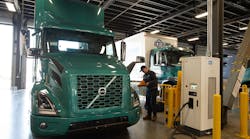Whenever the subject of electric vehicles comes up—or any other alternative-fueled vehicles for that matter—there is always someone who brings up the lack of “fueling” infrastructure as a deterrent to successful deployment.
And I will admit that many, if not most, commercial EVs out in the market today are operating in return-to-base duty cycles so a public, highway charging infrastructure is not a big concern. But we can’t ignore the fueling/charging infrastructure corridor needed when it comes to EVs in highway freight-hauling applications.
The trucking industry is being given the opportunity to provide some input on two new electric vehicle charging station programs that were included in the recently signed Infrastructure law. The National Electric Vehicle Formula Program was established to strategically deploy an interconnected network of EV charging stations along highway corridors. The Charging and Fueling Infrastructure discretionary grant program will make grants available to improve public accessibility to EV charging and hydrogen, propane and natural gas fueling stations, along designated alternative-fuel corridors.
While I am fairly certain these initiatives had infrastructure for charging passenger cars in mind, I don't see any reason why trucking can’t weigh in and share our thoughts on these efforts. The Federal Highway Administration is looking for comments on these two programs. You can see the full request for information here.
The comment period is open until Jan. 28, 2022, and I encourage you to offer your thoughts on this important subject. Charging trucks is not necessarily like charging cars, and the way charging stations are situated can impact a truck driver’s ability to access the charger. Let’s get our thoughts out there on the ground floor. It is best to have things built right the first time than to try to go back and “make them work” for trucks.
It appears as if the federal government is on board with a green future, so let’s make sure they hear trucking’s voice as they navigate charging infrastructure.
Michael Roeth has worked in the commercial vehicle industry for nearly 30 years, most recently as executive director of the North American Council for Freight Efficiency. He serves on the second National Academy of Sciences Committee on Technologies and Approaches for Reducing the Fuel Consumption of Medium and Heavy-Duty Vehicles and has held various positions in engineering, quality, sales and plant management with Navistar and Behr/Cummins.




